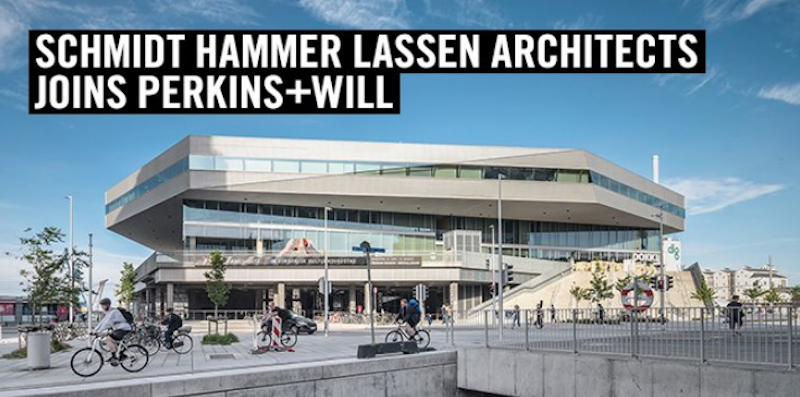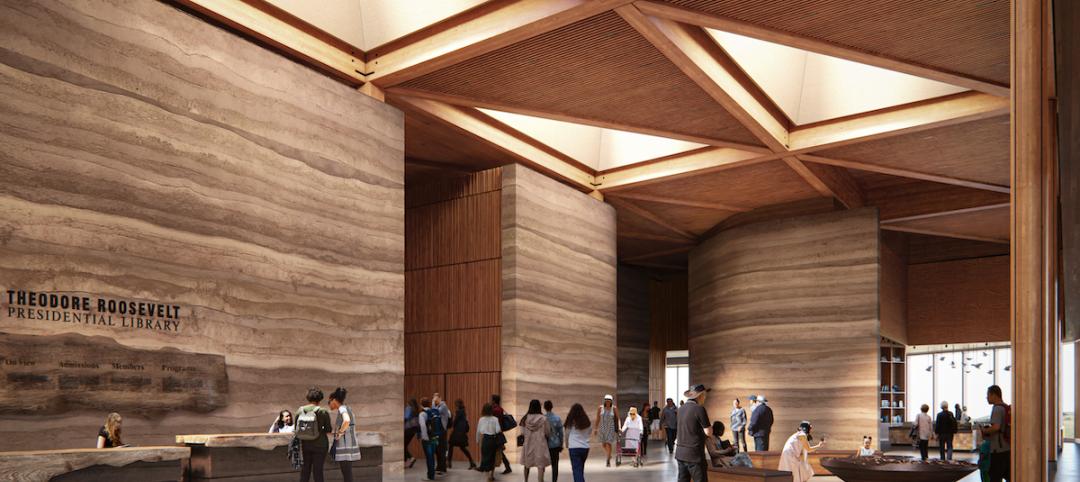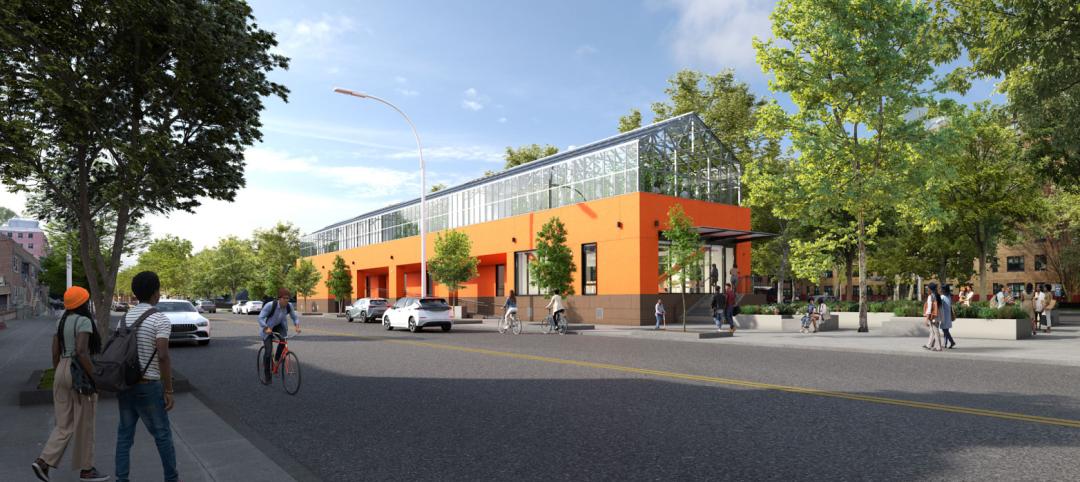One of Scandinavia’s most recognized design firms, Schmidt Hammer Lassen Architects, has joined global architecture firm Perkins+Will in a strategic partnership that extends Schmidt Hammer Lassen’s international reach and reinforces Perkins+Will’s commitment to sustainability and design excellence.
Founded in 1986, Schmidt Hammer Lassen is known around the world for its iconic, highly sustainable cultural and civic architecture, including The Black Diamond, the extension to the Royal Library in Copenhagen; ARoS Museum of Art in Aarhus, Denmark’s second-largest city; Halifax Central Library in Nova Scotia, Canada; the Katuaq Cultural Centre in Nuuk, Greenland; and the International Criminal Court in The Hague. The firm recently won a global competition to design the world’s largest library—the 1.2 million-square-foot Shanghai East Library—and it is currently working on the transformative Monroe Blocks mixed-use development in Detroit, Michigan, the firm’s first project in the United States.
By combining Perkins+Will’s 83-year legacy of design excellence with Schmidt Hammer Lassen’s illustrious Danish design pedigree, the united firms will make even greater contributions to the canon of cultural and civic architecture, according to Perkins+Will CEO Phil Harrison.
“Part of what makes this partnership so special is that Perkins+Will and Schmidt Hammer Lassen share a common set of values: design excellence, sustainability, innovation, and the highest level of client service,” Harrison says. “We also maintain the same design ethos, believing that exceptional architecture is always democratic and in the service of the greater good. We’re compatible at every level.”
Bjarne Hammer, founding partner of Schmidt Hammer Lassen, agrees:
“Our firms share a clear mission: through architecture and design, we make a positive difference in the world and in the lives of others. We both believe strongly in the transformative, healing power of design to address some of the most pressing social and environmental issues of our time. And, we both thrive in a design culture that encourages collaboration.”
Complementary Goals
In addition to a shared vision and purpose, the two firms have symbiotic market strategies. Perkins+Will aims to diversify its global talent, expand its cultural and civic practice, and reinforce the caliber of its design portfolio. At the same time, Schmidt Hammer Lassen aims to expand into new geographic markets, grow its client base, and apply groundbreaking design research to practice.
“We want to be known as a company that is both design-driven and client-focused, as a firm that produces extraordinary designs and delivers them with extraordinary efficiency. Merging with Perkins+Will enables us to maintain this critical part of our identity while having the support, technology, and reach of a much larger organization,” says Schmidt Hammer Lassen CEO Bente Damgaard. “It’s a fantastic opportunity.”
Perkins+Will’s global platform also provides a host of benefits to Schmidt Hammer Lassen’s international clients, Damgaard says, because they now have all of the resources, talent, and expertise—including research—they need within a single firm. This streamlines collaboration, facilitates communication, and ensures smooth project delivery.
Aligned In Design
The union of Perkins+Will and Schmidt Hammer Lassen is supported in large part by both firms’ legacies of, and commitments to, design excellence.
Over the last eight decades, Perkins+Will’s landmark projects of beautiful, thoughtful design—like the transformative Rush University Medical Center in Chicago, Illinois; the Shanghai Natural History Museum in China; and the Albion Library in Toronto, Canada—have characterized the essence of the firm. Similarly, Schmidt Hammer Lassen’s portfolio of award-winning architecture—projects that constitute works of public art in and of themselves—underscores the firm’s 32-year history of distinguished design. Examples of built work include Dokk1, the largest public library in Scandinavia; Malmö Live, a concert, congress, and hotel complex in Sweden; and Vendsyssel Theatre in Denmark, a music and theater hall that celebrates cultural exchange.
“Our firm is unequivocally rooted in Scandinavian architectural traditions, which are based on values like democracy, welfare, sustainability, light, openness, and social responsibility,” says Kristian Lars Ahlmark, senior partner at Schmidt Hammer Lassen. “Our buildings not only reflect these values, but they also impart these values on all who encounter them, whether tenants, visitors, or passersby.”
Synergies in Sustainability
Additionally, both Schmidt Hammer Lassen and Perkins+Will are known leaders in sustainability. Through their high-performing, environmentally responsive designs, the firms contribute significantly to the reduction of greenhouse gas emissions that cause climate change, and to the improvement of human and ecological health. The firms have designed hundreds of projects—collectively amounting to several hundred million square feet—that meet or surpass various international standards for green building. And their staff include many of the industry’s most sought-after experts in sustainable design.
“Sustainability is in our DNA at both Perkins+Will and Schmidt Hammer Lassen,” says Damgaard. “It’s just another example of the synergy between our firms—and of why this partnership makes sense.”
Cultural Diversity
The partnership is also a celebration of differences in culture, customs, language, and heritage—and of the design innovation that occurs when those differences interplay.
“Both of our firms believe in the global diversification of talent and creativity,” says Harrison. “We see the coming together of design cultures, aesthetics, and sensibilities as a positive force that leads to better, more thoughtful, more inclusive architecture. At Perkins+Will, we appreciate and celebrate Schmidt Hammer Lassen’s Danish design legacy, and look forward to the many ways it will positively influence our collective body of work.”
Related Stories
Mass Timber | Jun 10, 2024
5 hidden benefits of mass timber design
Mass timber is a materials and design approach that holds immense potential to transform the future of the commercial building industry, as well as our environment.
Lighting | Jun 10, 2024
LEDs were nearly half of the installed base of lighting products in the U.S. in 2020
Federal government research shows a huge leap in the penetration of LEDs in the lighting market from 2010 to 2020. In 2010 and 2015, LED installations represented 1% and 8% of overall lighting inventory, respectively.
Libraries | Jun 7, 2024
7 ways to change 'business as usual': The Theodore Roosevelt Presidential Library
One hundred forty years ago, Theodore Roosevelt had a vision that is being realized today. The Theodore Roosevelt Presidential Library is a cutting-edge example of what’s possible when all seven ambitions are pursued to the fullest from the beginning and integrated into the design at every phase and scale.
Education Facilities | Jun 6, 2024
Studio Gang designs agricultural education center for the New York City Housing Authority
Earlier this month, the City of New York broke ground on the new $18.2 million Marlboro Agricultural Education Center (MAEC) at the New York City Housing Authority’s Marlboro Houses in Brooklyn. In line with the mission of its nonprofit operator, The Campaign Against Hunger, MAEC aims to strengthen food autonomy and security in underserved neighborhoods. MAEC will provide Marlboro Houses with diverse, community-oriented programs.
Office Buildings | Jun 6, 2024
HOK presents neurodiversity research and design guidelines at SXSW 2024
Workplace experts share insights on designing inclusive spaces that cater to diverse sensory processing needs.
Architects | Jun 4, 2024
HED and Larson Incitti Architects merge, combine Denver staff
HED, a leading national architecture and engineering firm, today announced a merger with award-winning, Denver-based Larson Incitti Architects (LIA). The merger combines LIA's staff with HED's Denver office, significantly expanding the local team and leveraging community relationships to create new opportunities across multiple market sectors.
Airports | Jun 3, 2024
SOM unveils ‘branching’ structural design for new Satellite Concourse 1 at O’Hare Airport
The Chicago Department of Aviation has revealed the design for Satellite Concourse 1 at O’Hare International Airport, one of the nation’s business airports. Designed by Skidmore, Owings & Merrill (SOM), with Ross Barney Architects, Juan Gabriel Moreno Architects (JGMA), and Arup, the concourse will be the first new building in the Terminal Area Program, the largest concourse area expansion and revitalization in the airport’s almost seven-decade history.
Office Buildings | Jun 3, 2024
Insights for working well in a hybrid world
GBBN Principal and Interior Designer Beth Latto, NCIDQ, LEED AP, ID+C, WELL AP, share a few takeaways, insights, and lessons learned from a recent Post Occupancy Evaluation of the firm's Cincinnati, Ohio, office.
Multifamily Housing | Jun 3, 2024
Grassroots groups becoming a force in housing advocacy
A growing movement of grassroots organizing to support new housing construction is having an impact in city halls across the country. Fed up with high housing costs and the commonly hostile reception to new housing proposals, advocacy groups have sprung up in many communities to attend public meetings to speak in support of developments.
MFPRO+ News | Jun 3, 2024
New York’s office to residential conversion program draws interest from 64 owners
New York City’s Office Conversion Accelerator Program has been contacted by the owners of 64 commercial buildings interested in converting their properties to residential use.

















